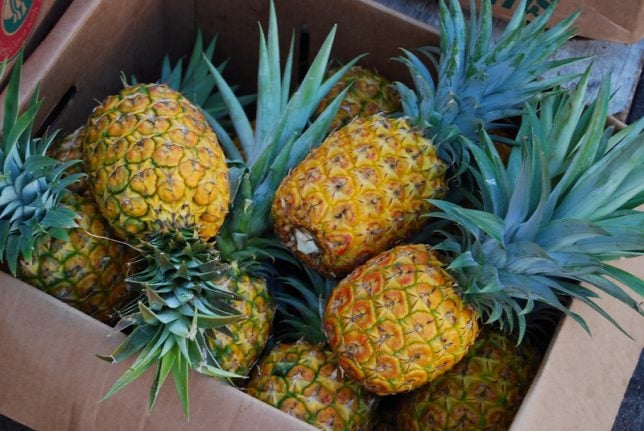Edwin Congo and a one-time doctor to Argentine football icon Diego Maradona were arrested, along with 16 others, police said.
The ring would conceal small amounts of cocaine — no more than 100 grammes — in the paper of each box which it then recovered “through a complex chemical process” at its labs in the Netherlands and Bulgaria, police said in a statement.
A video released by police showed a machine crushing cardboard boxes to a pulp, which was then pressed in another container to extract the cocaine.
Detenidas 18 personas e incautada una tonelada de cocaína impregnada en el cartón de cajas de fruta gracias a una macrooperación internacional liderada por la Policía Nacional y desarrollada en #España, #Bulgaria, #PaísesBajos y #Colombia. pic.twitter.com/fd0vlqANJt
— Policía Nacional (@policia) May 13, 2020
Police seized one tonne of cocaine in Bulgaria in January, which the Spain-based gang is suspected to have smuggled into Europe.
The drug was infused in over 6,600 cardboard boxes containing limes and pineapples that arrived in Greece from Colombia.
Spanish police said they were led to the ring when they started to investigate the “illegal activities” of Colombian doctor Mauricio Vergara, who owns a beauty clinic in Madrid and is famous for having helped Maradona lose weight.
Vergara was arrested in 2002 for drug trafficking in Colombia, while Maradona has undergone rehabilitation for cocaine abuse.
The ring is suspected of having used Vergara's clinic in Madrid as its “centre of operations,” a Spanish police source told AFP.
Congo, who retired from football in 2009, was released after being questioned by the police.
He acknowledged having traded in emeralds with some of the other suspects but denied any wrongdoing.
“I am innocent, I have absolutely nothing to do with the sale, manufacture or anything that has to do with cocaine,” the 43-year-old Colombian told Spanish television station La Sexta on Tuesday night.
Congo defiende su inocencia: “Estoy muy tranquilo. No trafico con cocaína ni tengo cocaína en casa. Soy inocente y no tengo nada que ver”. https://t.co/rqX9ek5AEP
— laSexta (@laSextaTV) May 13, 2020
READ ALSO:



 Please whitelist us to continue reading.
Please whitelist us to continue reading.
Member comments